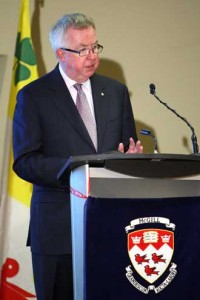
Former PM says conference is just a stepping stone
By Pascal Zamprelli
“Of all of the factors that drive people who live on the edge of violence or despair over that edge, not being able to feed your child or yourself is pretty close to the top,” said the Rt. Hon. Joe Clark, sixteenth Prime Minister of Canada, Professor of Practice for Public-Private Sector Partnerships at the McGill Centre for Developing-Area Studies, and co-Chair of McGill’s recent Conference on Global Food Security.
As production decreases and populations are on the rise, Clark noted, the need for action on the global crisis is evident. But the conference sought to tackle those questions still in need of answers: What should that action be? How can we make it happen?
For Clark, it can’t just be about experts coming together to report from their separate fields. “Rather,” he said, “what we’re trying to generate here is a co-operating relationship, where people with backgrounds in different aspects of this issue can bring forward their knowledge and try to find a new way in which the issue can be addressed.”
McGill’s convening power is one of its major strengths, he said, because these issues “need a sponsor that can cause them to move forward,” which can be most effective when, as in the case of food security, “it’s married to a real issue, and driven by real experts like Dean of Agricultural and Environmental Sciences Chandra Madramootoo and his colleagues.”
“This sounds almost incidental to solving a problem, but you have to frame a problem to get people to solve it,” Clark said about the important first step of defining the issue of food security, which rests upon linking seemingly disparate events, from Haitian food riots to food bank shortages in Montreal. “It is seen as a multitude of unrelated crises, when it is in fact the result of an intersection of crises.”
He hopes the conference will help spark Canada to assume the leadership role it has in the past on global issues, as was the case in the mid-eighties when Clark, as Minister of Foreign Affairs, steered his government in leading the Western response to famine in Ethiopia. But the situation with food security today, he specified, is more systemic, broader in scope and thus more complex.
“We have a multitude of Ethiopias happening,” he said, adding that traditional responses like food aid won’t address the crisis’s roots. “They might make things less terrible, but they’re not going to be the real solutions,” such as investments in infrastructure and education. “You see, building a road might not sound like helping food security. It may sound like a different issue – it isn’t a different issue. Part of the challenge of the process we hope to popularize and move forward here is to take people who know some of these specific issues and get them working together.”
But how to ensure sure that the ideas and solutions generated at the conference actually influence decision-makers? Clark suggests asking two questions: Where is action needed most? Where is action most likely to occur? “You find some consensus, start to build on that.”
Citing the success of the environmental movement as a useful model, he added that “public opinion can change attitudes.” While more technical expertise is crucial to “solving the substance of the problems,” public opinion and engagement “make it possible for the problems to be addressed.”
The Conference on Global Food Security represents a critical step toward that goal, but Clark was quick to emphasize that it can’t end here if the momentum created is to continue and grow. The conference, he said, is “obviously the first step in a much larger process.”
